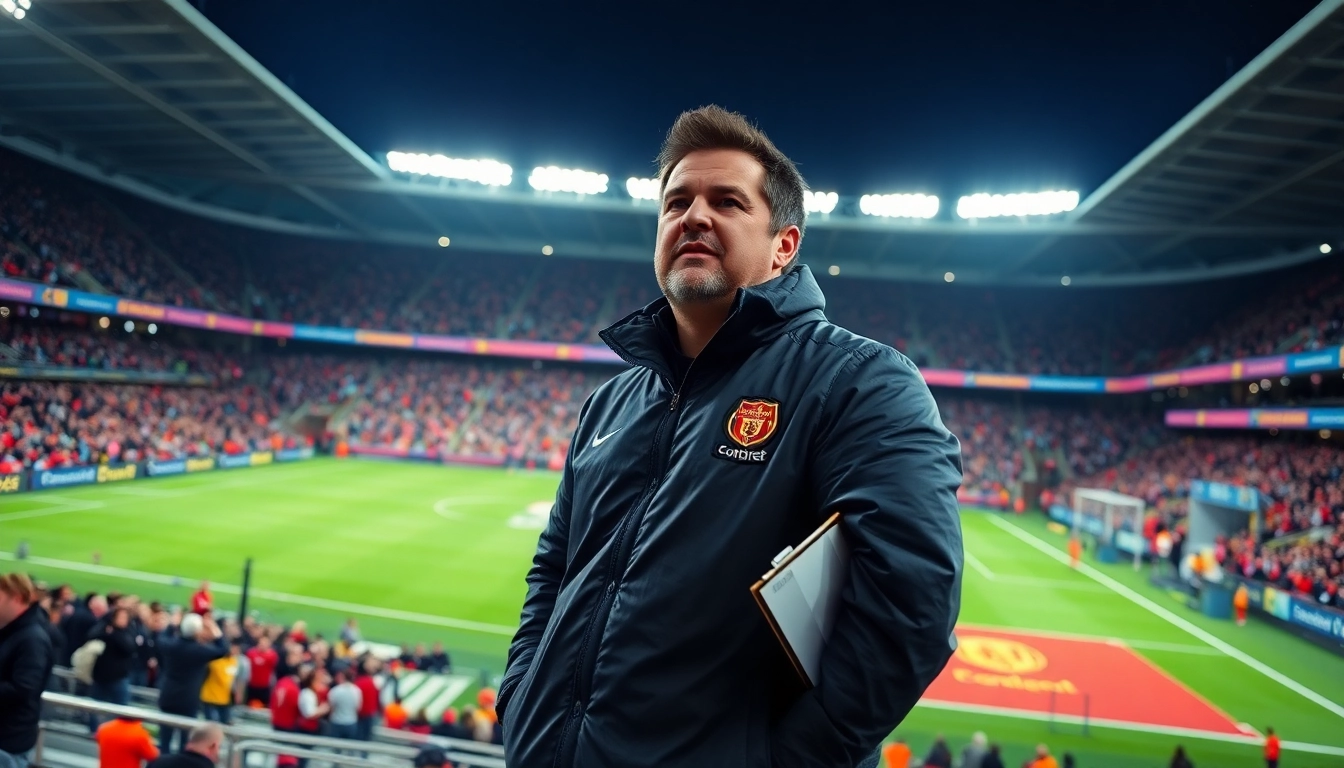The Leadership Philosophy of Marco Silva: Strategies for Success in Football

1. Introduction to Marco Silva’s Coaching Style
Marco Silva, a name that resonates with passion for football and sharp tactical ingenuity, has steadily established himself as a prominent figure in the world of football management. His career has seen him touch multiple clubs across various leagues, each time leaving a distinct mark. In analyzing his coaching style, we can delve into the philosophies and principles that underpin his strategies, offering a glimpse into how he creates competitive teams that consistently challenge for success. Understanding the dynamics of his approach not only illuminates individual matches but also positions Silva as a forward-thinking leader capable of influencing the modern game. For an in-depth exploration of Silva’s methodologies, visit the dedicated page on marco silva.
1.1 Overview of Silva’s Career Path
Marco Silva’s journey began on the pitch as a professional player. After a decade-long career primarily in Portugal, he transitioned to coaching, where he would significantly impact teams like Estoril Praia, Sporting CP, and more recently, Fulham FC. Silva’s coaching style evolved through varied experiences across domestic and international leagues. His initiation at Estoril, where he earned promotion to the Primeira Liga, marked the beginning of his rise. Subsequent short stints with clubs like Sporting CP showcased his potential to manage high-pressure environments though results were often mixed.
His tenure at Watford, where he led the team to an impressive start in the Premier League, further highlighted his capacity to adapt and innovate tactically. Though his time there ended amidst turbulent circumstances, Silva’s reputation as a tactical thinker grew, leading him to join Everton FC. Silva faced challenges there but his time at the club was instrumental in further developing his coaching philosophy, which he has since reinvigorated at Fulham.
1.2 Core Principles of His Leadership
Leadership in football transcends mere tactics; it involves building relationships and fostering an environment conducive to success. Silva embodies this through a clear set of principles that guide his coaching approach. His first principle focuses on communication—ensuring that players understand not only their responsibilities but also the tactical framework surrounding the game. Silva believes in forging strong bonds with players, empowering them, and instilling confidence. This was evident during his time at Fulham, where players consistently acknowledged the positive influence of his support.
A second principle involves adaptability. Silva emphasizes the importance of tailoring strategies to capitalize on both his team’s strengths and the weaknesses of opponents. This flexibility is paired with an ongoing commitment to tactical evolution, enabling teams to remain competitive in the ever-evolving landscape of football.
1.3 Importance of Team Culture
Creating a winning culture is paramount in sports, and Silva places great importance on this aspect of management. He works diligently to foster an environment where players feel valued and equipped to reach their potential. Key elements include collective responsibility and mutual respect amongst players, which Silva nurtures through team-building exercises and open dialogues. This strong culture not only motivates players but also enhances overall team performance, forming a bedrock for Silva’s strategies to thrive.
2. Analyzing Silva’s Tactical Approaches
Marco Silva’s tactical acumen is one of the hallmarks of his coaching career. His ability to analyze opponent strengths and weaknesses and tailor his strategies accordingly is notable. Understanding the intricacies of his tactical formation and strategy adaptation illuminates how Silva orchestrates his teams effectively.
2.1 Formation Trends Throughout His Career
Throughout his career, Silva has showcased versatility in his choice of formations, often adjusting based on the opponent and the match situation. His default approach tends to feature a 4-2-3-1 formation, striking a balance between defensive solidity and attacking prowess. This setup allows for fluid transitions between different phases of play, facilitating both defense and offense within a cohesive framework.
Notably, during his tenure at Fulham, Silva amended his tactical setup to accommodate the strengths of the squad, often shifting towards a 4-3-3 or a 3-4-3. This adaptability not only reflects Silva’s understanding of game dynamics but also highlights his confidence in the capabilities of his players. His ability to switch formations seamlessly has been key in outmaneuvering opposing teams, especially in tightly contested matches.
2.2 Adapting Strategies to Opponents
Silva’s approach extends beyond just formations; it includes a keen analysis of opponent tactics and psychological states. Prior to matches, Silva invests time in scrutinizing how competing teams play, focusing on their formations, strengths, and areas of vulnerability. This research informs his game plan, allowing him to configure lineups that not only prepare his team for challenges but exploit opponents’ weaknesses effectively.
For instance, against teams favoring possession, Silva’s teams often adopt a compact defensive structure, emphasizing counter-attacking football to exploit the opposition’s offensive commitment. This strategic fluidity has proved crucial in high-stakes matches, including several encounters during the Premier League season.
2.3 Utilizing Data Analytics in Game Preparation
The modern game demands a level of analytic scrutiny to maintain a competitive edge, and Marco Silva embraces this reality. Silva employs data analytics expertly, harnessing performance metrics to assess player fitness, game situations, and scouting reports. These insights help inform training sessions and game strategies, enhancing a team’s preparedness.
By valuing historical data and current match statistics, Silva can also adapt in-game tactics dynamically. Adjustments based on real-time data allow Silva’s teams to counteract strategies employed by their opponents effectively. This foresight and preparation have garnered attention, showcasing the blend of traditional coaching acumen with modern analytical capabilities.
3. Key Challenges Faced by Marco Silva
While Marco Silva has experienced significant successes, his journey has not been devoid of challenges. The pressures of coaching at top clubs, managing varied player dynamics, and navigating adversity in matches present a myriad of hurdles. Acknowledging these challenges underscores the resilience Silva has developed over his coaching career.
3.1 Navigating Team Pressure and Expectations
High expectations accompany managerial roles in elite clubs. Silva has frequently faced immense pressure to produce immediate results, a reality that can lead to stress and affect player morale. Managing such expectations requires a robust psychological approach—not only to focus on winning but also to foster a supportive environment for players. Silva emphasizes strong communication in times of pressure, reminding players to focus on processes instead of results. This philosophy encourages resilience, enabling players to perform without the weight of negative expectations.
3.2 Dealing with Player Dynamics and Morale
In any football environment, navigating player dynamics can be challenging. Silva’s commitment to an inclusive culture fosters solidarity, but individual personalities can impact collective morale and focus. He employs a thoughtful approach, recognizing the necessity of balancing squad harmony while also managing player grievances or conflicts. Maintaining ongoing communication with players and regularly checking in on their mental states ensures that issues can be addressed before they escalate. This attention to relationship-building remains a pillar of Silva’s coaching strategy.
3.3 Overcoming Adversity in High-Stakes Matches
The pressures of high-stakes matches can test the limits of any coach, including Marco Silva. Whether facing a crucial relegation battle or a key encounter against a title rival, these matches present unique challenges. Silva’s tactical preparation tends to emphasize motivation—both technically and emotionally. He designs training that simulates high-pressure scenarios, helping players acclimate to the demands of crucial games. Drawing upon experiences from previous matches, Silva focuses team discussions on maintaining composure and strategic execution, rather than succumbing to the external pressures of expectation.
4. Training and Development Techniques Employed by Silva
Marco Silva’s approach to training and player development is wide-ranging, reflecting his commitment to nurturing talent while ensuring tactical efficiency. Silva’s training regimens combine technical skill enhancement with mental fortitude, focusing on preparing players for both individual and collective responsibilities within the game.
4.1 Focus on Youth Development and Scouting
Youth development is a cornerstone of football clubs looking to build competitive squads from the ground up, and Silva recognizes its importance. He advocates for integrated scouting systems that identify young talent, emphasizing coaching methodologies that facilitate development. Silva is particularly enthusiastic about mentoring young players, providing them with opportunities in competitive environments to rapidly enhance their performance and confidence.
Moreover, Silva’s connections with youth academies allow him to stay informed about emerging talents, ensuring he can integrate promising players into the senior team seamlessly. His commitment to youth development has already borne fruit in various clubs through young, homegrown talents making significant contributions on the first team.
4.2 Implementing Effective Training Regimens
Silva employs diverse training techniques tailored to player needs which range from technical drills to tactical simulations. His sessions often emphasize positional awareness, ball retention, and effective transitioning between attacks and defenses. Silva encourages intense competition within training, pushing players to attain peak performance levels while honing their skills and fitness.
Beyond physical preparation, mental resilience is a focus area where Silva integrates psychological techniques to bolster player focus and tenacity. Mindfulness practices and teamwork exercises are integrated into weekly training regimens, fostering a mindset geared toward overcoming in-game challenges efficiently.
4.3 Fostering Resilience and Mental Toughness
In high-tempo environments, mental resilience is as critical as technical prowess. Silva actively promotes a culture of resilience through motivational talks, mindfulness exercises, and team-building activities. He frequently discusses overcoming failures and challenges, transforming difficult experiences into valuable lessons. Silva’s approach aims to prepare players not just physically but also mentally, enabling them to recover quickly from setbacks during matches. This philosophy has been instrumental in creating squads with high spirits that can navigate the inevitable ups and downs of the football season.
5. Future Prospects for Marco Silva in Football
The future of Marco Silva in football holds intriguing possibilities, featuring opportunities for club leadership and contributions to the evolution of football tactics. His journey thus far indicates a pathway steeped in ambition and potential, which suggests an exciting trajectory moving forward.
5.1 Potential Club Moves and Career Growth
As Silva continues to develop as a manager, the conversation surrounding his next steps is inevitable. His ability to lead teams and produce coherent tactical results may attract attention from higher-profile clubs looking for fresh talent. The interest from top-tier leagues across Europe could present opportunities for Silva to push his career to new heights, each new role offering avenues for further growth and development.
Additionally, with clubs rebuilding and fostering new philosophies in post-pandemic football, Silva’s expertise could prove invaluable. His understanding of player development and tactical versatility positions him as an attractive candidate for clubs needing a transformative mindset.
5.2 Contributions to the Evolution of Football Tactics
Marco Silva is not merely a coach but also a thinker, eager to contribute to the evolving landscape of football tactics. His adeptness in utilizing modern analytics and embracing innovative approaches places him at the forefront of progressive coaching trends. Silva’s perspectives on tactical flexibility challenge traditional methods, opening new avenues for evaluating game scenarios and strategic positioning.
Silva’s approach encourages future generations of coaches to prioritize adaptability and a data-driven methodology in their tactical frameworks. As football continues to evolve, influential minds like Silva will play a pivotal role in how the game develops and how future coaches approach football management.
5.3 Vision for Future Football Leadership
Marco Silva’s vision echoes a commitment to progressive football, ownership of culture in the locker room, and a dedication to player enhancement. His insights around emotional intelligence in coaching highlight a future where leaders are as much champions of their player’s development as they are of winning matches.
Looking ahead, Silva aims to instigate a more inclusive and thoughtful approach to management. His experiences will shape how he continues to lead, offering approaches that balance tactical awareness with fostering strong interpersonal relationships. As football adapts, Silva’s forward-thinking philosophy will undoubtedly influence the next generation of coaches, instilling the importance of balanced leadership in the pursuit of success.






